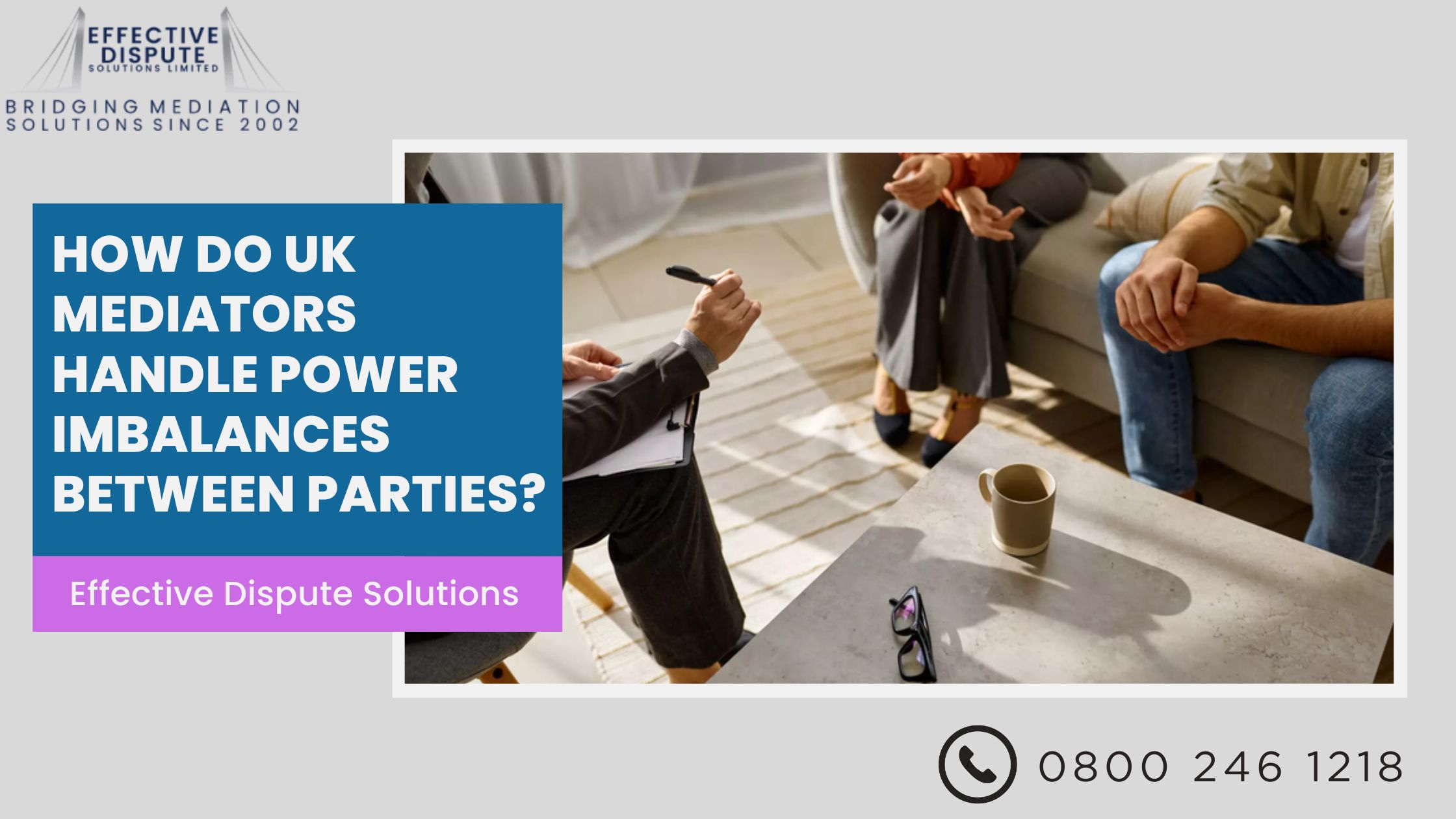When two people argue, it’s rarely an equal fight. One may be louder. One may have more money. One may know the legal system better. The other may feel nervous, quiet, or simply outmatched. That’s what’s called a power imbalance.
So here’s the big question: if the whole point of mediation is to give an equal voice to both sides, what happens when one party seems far stronger than the other?
This matters because if one of you feels silenced or pressured, the outcome may not last. The good news is that mediators in the UK are specially trained to notice these imbalances and adjust the process. Their job is to make sure both voices are respected. Let’s unpack exactly how they do that.
What Is a Power Imbalance in Mediation?
Think of disputes you’ve seen or been part of. Maybe it’s a boss and an employee clashing. Maybe it’s a landlord demanding rent from a struggling tenant. Or maybe it’s two neighbours fighting over a fence line.
In all these examples, one party seems “bigger” in some way:
- Money: The boss earns far more than the employee.
- Status: the landlord owns the property, while the tenant feels replaceable.
- Personality: one side is outspoken and confident, the other is quiet and unsure.
- Knowledge: one person understands contracts and rights, the other doesn’t.
This is normal in life. But during mediation, it’s dangerous because resolution only works when both people have their say. If one side dominates, you don’t get an actual agreement, you get pressure. Also, pressured agreements often crumble later.
That’s why conflict resolution relies so heavily on balance. Mediators step in as third-party facilitators, creating a safe space where even the quieter, weaker voice can rise.
The Unique Role of Mediators UK
A mediator is not your judge. They don’t take sides. They also don’t hand you a decision like a court would. Instead, they guide the conversation. That sounds simple, but it isn’t, especially with one strong party and one weak. That’s where their skills matter most.
Here’s what mediators UK actually do during these moments:
Ground Rules at the Start
Before the discussion begins, mediators explain what behaviour is expected. No interrupting. No shouting. No attempts to control the other person’s words. These rules balance the room from the first minute.
Separate Meetings (Caucuses)
Mediators often speak to each side alone during the process. If you are the quieter or weaker party, this lets you explain your version without fear of being cut off. It’s a private space where your voice is protected.
Equal Time to Speak
Stronger voices naturally talk more. Mediators watch for this and pause the stronger party when needed. They then invite the weaker party to finish. You are given as much time as necessary to share.
Rephrasing and Neutral Language
If one side says something intimidating, the mediator often rephrases it in neutral terms. This lowers tension and keeps focus on issues rather than power plays.
Breaks if Needed
Sometimes conversations get heated. A mediator may call a pause or shift to private sessions to restore calm. This helps protect people who might otherwise feel pressured to give in.
All of this is done quietly, almost invisibly, so both sides feel the process is equal and fair.
Controlling Behaviour in Mediation
Sometimes a strong party uses tactics to push the weaker one down. This could look like:
- Talking over them.
- Dismissing or mocking their points.
- Using threats, even subtle ones.
Mediators are trained for this. They do not let intimidation stand. They may call out the behaviour, pause the session, or remind both sides of the ground rules. If the controlling behaviour continues, the mediator can even stop the process.
Why is this important? Because mediation only works when both parties choose to take part freely. Agreements based on fear or pressure are not valid agreements at all.
Supporting the Weaker Party
Balance isn’t just about stopping the strong, it’s about lifting the weak. Mediators know that quieter parties need support in advance.
Here are some ways they prepare:
- Pre-session preparation: helping you list the key points you want to raise.
- Written statements: giving you another way to present concerns if speaking feels too hard.
- Support in the room: sometimes allowing you to bring someone for moral support.
- Pacing: adjusting how long sessions last, and offering breaks, so you don’t get overwhelmed.
These steps help you speak with confidence, even if you walked in feeling outmatched.
Why Balance Matters So Much
If one side dominates, the process fails. Why? Because the weaker party will only agree under pressure, and later regret it. That makes the deal unstable. When mediators balance things out, both voices are heard. And when both voices are heard, compromises become more sensible, more practical, and more lasting.
This is what separates mediation from court. In court, the stronger solicitors often win. In mediation, winning isn’t the goal. Understanding is. And with understanding, agreements stick.
What If Power Differences Are Huge?
You might think mediation can’t work if power differences are too significant. Imagine a small family-run business against a giant corporation. The “David and Goliath” if you will. Can that really be equal?
Surprisingly, yes. The mediator acknowledges the gap openly, but then makes adjustments. They give the smaller party more time. They shift the setting to reduce pressure. They ensure respect is constant. These shifts don’t erase power, but they reduce it enough so both sides talk eye-to-eye.
That’s why mediation often succeeds even when the odds feel stacked. It’s not about pretending both sides are equal in life. It’s about building a process where both sides are equal in the room.
Benefits of Handling Power Imbalances
When a mediator manages the process well, you gain several things:
- You feel safe enough to explain your side.
- Agreements feel fair because they reflect both voices.
- Stress and fear decrease compared to legal battles.
- Solutions are reached faster, often in a day instead of months.
- Both people leave with dignity protected, not ruined.
These are not small outcomes. They can change the way you view the conflict itself.
FAQs About Mediation and Power Imbalances
Q1. Can the mediator stop bullying behaviour on the spot?
A: Yes. Mediators are trained to step in firmly and immediately if one side tries to control or intimidate the other.
Q2. What if one party refuses to respect the rules?
A: The mediator can end the session. Mediation depends on good faith from both sides.
Q3. Is the agreement binding?
A: Yes. Once you both sign, the settlement becomes binding in law, except for community or workplace cases, where agreements rely on trust and good faith.
Q4. Why not just go straight to court instead?
A: Court can drag on for months or years. Mediation usually resolves things in a single day. It’s private, less stressful, and far cheaper.
Final Thoughts
Disputes often don’t feel equal. One side may seem stronger, louder, or more confident than the other. But in mediation, the job of the professional is to close that gap so you both get heard.
Mediation ensures all are treated equally, it is not about legal tricks. Not legal tricks. Not who has the strongest voice. Just two sides coming together with the help of a skilled guide who knows how to balance things out.
That’s why organisations like Effective Dispute Solutions make it their focus to ensure mediation is safe, respectful, and effective for everyone, no matter how big or small the imbalance might seem.


